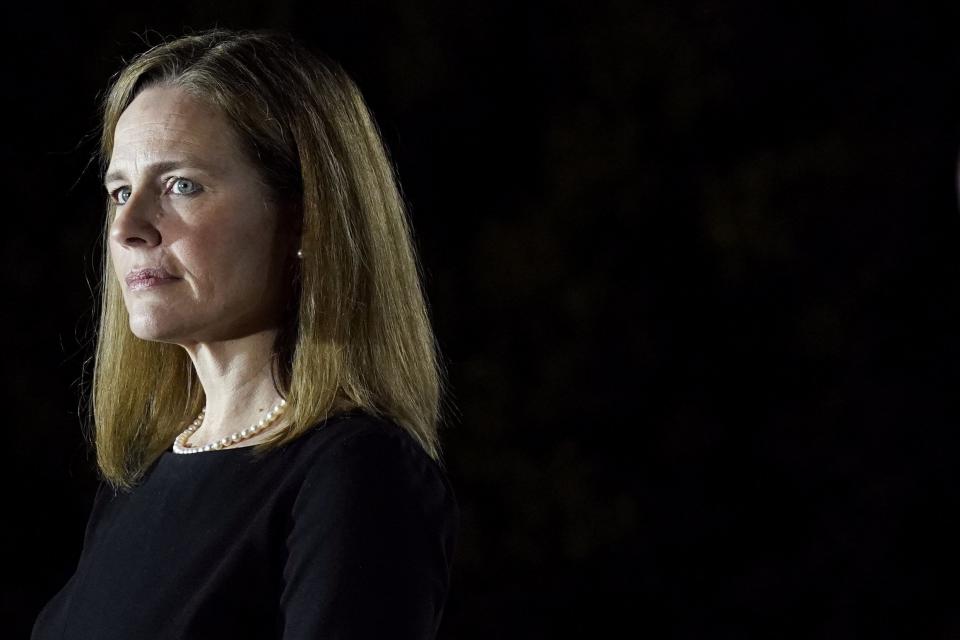Reading Justice Barrett: Does ability to adopt remove right to abort?
Astute listeners are trying to take their clues about the fate of Roe v. Wade from the questions of the three Supreme Court justices whose votes are unknown—Chief Justice John Roberts, Brett Kavanaugh and Amy Coney Barrett. This set of conservative justices, while listening to arguments about notorious Texas’ S.B. 8 law last month, demonstrated some hesitation about overturning Roe and further dismantling the inherent legitimacy of the highest court in the land.

Things haven’t been going well for anyone interested in the Court upholding a woman’s right to choose. Just about an hour into arguments, Barrett asked a question that seemed more revealing of her vote than anything else thus far. It was about adoption—as the junior justice put it:
So petitioner points out that in all 50 states, you can terminate parental rights by relinquishing a child after abortion [ed. note, she misspoke; she means ‘birth’], and I think the shortest period might be 48 hours if I’m remembering the data correctly. It seems to me seen in that light—both Roe and Casey emphasize the burdens of parenting. And insofar as you and many of your amici focus on the ways in which forced parenting, forced motherhood would hinder women’s access to the workplace, and to equal opportunities, it’s also focused on the consequences of parenting and the obligations of motherhood that flow from pregnancy—why don’t the safe haven laws take care of that problem? It seems to me that it focuses the burden much more narrowly, there is without question an infringement on bodily autonomy, for which we have another context like vaccines—however, it doesn’t seem to me to follow that pregnancy and then parenthood are all part of the same burden, and so it seems to me that the choice, more focused, would be between say the ability to get an abortion at 23 weeks, or the state requiring the woman to go 15, 16 weeks more, and then terminate parental rights at the conclusion. Why didn’t you address the safe haven laws and why don’t they matter?
More: Supreme Court signals support for Mississippi 15-week abortion ban with Roe v. Wade in balance
More: Supreme Court's decision in abortion case will affect dozens of states beyond Mississippi
The lawyer for Jackson Women’s Health, attempting to answer Coney Barrett’s question, points out that adoption has indeed existed since Roe was first decided and therefore changes to adoption should not mean much. She goes on to make the obvious points that pregnancy and birth in particular have dramatic effects on a woman’s health, and later she suggests that the choice to give a child up for adoption is its own burden, not something to lightly suggest is easy.
But Barrett did not seem convinced, replying that neither Roe nor Casey spend much time on adoption, once again suggesting that the existence of adoption might obviate the need for abortion.
Cyber Week Sale
Need a gift idea for someone who wants to be more informed, educated and entertained? Take advantage of this introductory offer for new subscribers. Get all digital access to The Palm Beach Post for 6 months for only $1. Click here and subscribe today.
One of the main arguments the state of Mississippi is making in this case is that pregnancy, and parenthood by extension, is no longer burdensome because of many economic and social developments that make pregnancy safer and parenting easier. (They’re wrong.) It appeared Barrett was adding adoption to that list, suggesting it’s easy to carry a child to term and easy to give that child up.
Perhaps it’s relevant to point out that Barrett is a mother of seven, including two children who are adopted. Roberts has two adopted children, and Justice Clarence Thomas has an adopted child as well.
This article originally appeared on Palm Beach Post: Abortion case: Barrett hints ability to adopt removes right to abort

